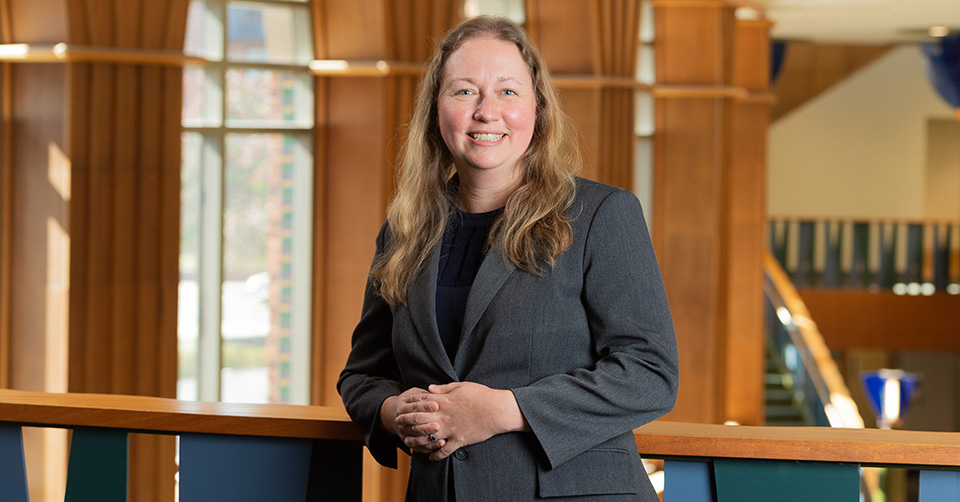Driving interdisciplinary strategies for Combating Infectious Diseases

Emily Martin
Associate Professor of Epidemiology
I’ve always been interested in infectious diseases, and vaccines are scientifically very interesting to me. There are also a lot of social and behavioral components that go into getting a community vaccinated and I have found that duality to be very intriguing.
I grew up in Portage, Michigan outside of Kalamazoo, and I had very supportive science teachers throughout high school. They impacted me in a big way while growing up in terms of convincing me—when I sometimes wasn't convinced myself—that I should take on hard problems and try to solve them. To this day, they were very influential in me having the confidence to move into what I want to do.
Now, I specialize in the study of respiratory viruses and how well vaccines work and what we can do to continue to improve vaccines. What attracted me to the University of Michigan School of Public Health was the opportunity to focus deeply on the epidemiology of viruses with a lot of other epidemiologists that have the same interest and could really have this very interactive academic environment.
Almost every day, I feel pushed and I learn in some way, whether it is about being a better epidemiologist, being a better virologist or even learning more about fields that we have experts in that I'm new to. I’m always learning new things here, such as social epidemiology or methods and statistics.
Something I had to learn very quickly throughout the COVID-19 pandemic was how to communicate messages cleanly and clearly and how to communicate to the public. As someone with a background in respiratory diseases, I quickly became a go-to expert for local and national media and even for folks within the University of Michigan community.
When the vaccine rollout began, clear and understandable communication became even more important.
For all the debates about the COVID vaccine, the vaccine still markedly reduces hospitalizations from respiratory illness at the end of the day. We can debate about what spike protein goes into the vaccine and when we should deliver it, but the important thing at the end of the day is that it reduces hospitalizations, and no other preventative measure really does the same job for COVID the same way the vaccine does. I had to learn how to do that, how to step back from the scientific debate to give people the information that they need to be able to make decisions. People need to know the process that we go through in making these important medical decisions, but you must present the facts in a way that people can understand where the information is coming from.
As an associate professor of Epidemiology at Michigan Public Health and the faculty lead for this new initiative, Public Health IDEAS for Combating Infectious Diseases, my team and I are very focused on our goal of driving interdisciplinary strategies. We already have a lot of strengths here at Michigan Public Health in terms of developing interventions—figuring out what works, figuring out what's needed for an intervention and figuring out how that works—but interventions and preventative strategies don't work when no one uses them or when policy does not support their use, or they aren't rolled out into populations in effective ways.
One of the things we really want to foster in this initiative is making connections so interventions that get discovered or developed earlier in the scientific process can be brought to help communities as quickly as possible.
I'm really excited to work more with other departments in the School of Public Health as part of Public Health IDEAS. I see this as a chance to uncover all of the strengths we have in our school, and start to put together this puzzle of how we can complement each other to answer questions in ways that we wouldn’t be able to individually.
I'm so interested in the parts of our field where public health diverges from clinical research or more traditional medical ways of approaching problems. Public health is unique in that we think about protecting whole populations. How do we protect the vulnerable? How do we apply policies in a way that minimizes things like health inequities?
I'm excited for how Public Health IDEAS for Combating Infectious Diseases can get us closer to those answers, and excited to do this work at Michigan. I am dedicated to working here and thrilled about our work here; the school means a lot to me. Being able to be a part of moving the school forward—but then also training the next generation of epidemiologists—is just something that I feel really passionate about.
About the author
Emily Martin’s research focuses on infectious diseases and respiratory viruses, including influenza, SARS-CoV-2, and RSV, and strategies to prevent and treat infection. She studies vaccine effectiveness and virus transmission in community, hospital and ambulatory settings. Her research is funded by the Centers for Disease Control and Prevention, the National Institutes of Health and philanthropic organizations. A faculty member at Michigan Public Health since 2014, Martin is a core investigator for the CDC’s US Influenza Vaccine Effectiveness Network, the CDC’s IVY network for hospital vaccine effectiveness, and the NIAID Centers of Excellence for Influenza Research and Response. Throughout the COVID-19 pandemic, she has been an in-demand expert appearing regularly in The New York Times, The Atlantic, and other major media outlets.
